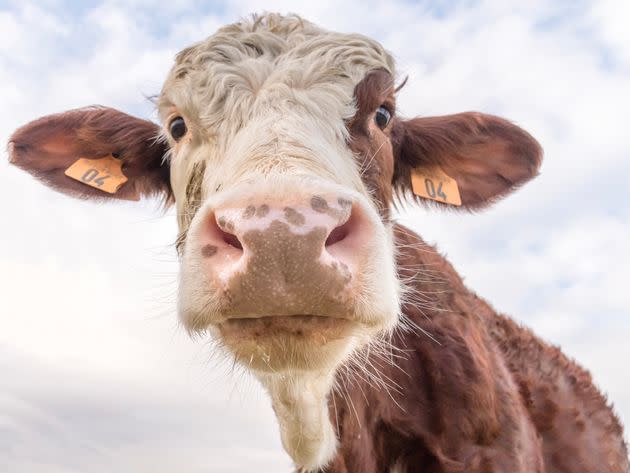Is Beef Tallow Skin Care Safe? Dermatologists Explain The TikTok Trend.

Beef tallow is rendered-down beef fat, a waxy substance that’s had all beef solids and moisture removed from it, according to the U.S. Department of Agriculture. It’s commonly used to make soap and candles. So why are people on TikTok putting it on their face?
On TikTok, videos tagged #beeftallow have more than 45 million views, and #beeftallowskincare have over 14 million views. Users claim beef tallow can help smooth wrinkles, soothe rashesand burns, relieve eczema and improve acne. For example:
@julia.yak Replying to @gsj777pearl #healthyliving#beeftallow#beeftallowskincare#animalbased#holistichealing#wellnesstips#holistichealthcoach
♬ original sound - Julia Yak
But dermatologists say they’re not slathering beef tallow on their skin any time soon, as there’s no scientific evidence that it offers skin care benefits.
“As a medical professional, I cannot recommend or endorse the use of beef tallow for any medical purposes, including skin care,” said Dr. Ife Rodney, a board-certified dermatologist and founder of Eternal Dermatology and Aesthetics in Fulton, Maryland. “While some people may have positive experiences with it, and it does contain vitamins and minerals typical in skin care, there are other medically approved and proven alternatives to treat your skin issues.”
Since beef tallow also isn’t Food and Drug Administration-approved for use as skin care, Rodney said it could pose safety risks.
Dr. Hadley King, a New York-based board-certified dermatologist, also doesn’t recommend beef tallow for your skin. “Many people are looking for options that are cruelty-free, sustainable and ‘clean,’ and beef tallow is none of these,” she told HuffPost.
Could beef tallow offer any skin care benefits?
It’s not that far-fetched that people are using beef tallow in their skin care routines. For centuries, people have used plant and animal fats as moisturizers, Rodney said. “However, it’s important to note that not all fats are created equal, and some may be more beneficial than others.”
Beef fat does have moisturizing properties. King said it’s high in triglycerides and fatty acids, which offer emollient benefits. Emollients help with “skin barrier function, membrane fluidity and cell signaling,” leading to overall improvements in skin texture and appearance. It might also help with dry skin.
Beef tallow contains antioxidants, like omega-3 fatty acids, which can fight free radicals, and offers anti-inflammatory and antimicrobial benefits, Dr. Jaimie DeRosa, a Boston-based board-certified facial plastic surgeon, told HuffPost.
It’s also packed with linoleic acid, or omega-6 fatty acid, known for its anti-inflammatory benefits and antioxidant properties, said Dr. Deanne Mraz Robinson, a board-certified dermatologist and co-founder of Modern Dermatology in Westport, Connecticut. Linoleic acid could improve symptoms of eczema, psoriasis and rashes.
The fat is also rich in vitamin A, which helps your sebaceous glands that naturally produce an oily substance that protects your skin, function better, DeRosa added. And, it’s rich in fat-soluble vitamins D, E, and K that boost collagen production and skin rejuvenation.
“As you age, the skin produces less of certain lipids, which can lead to volume loss, skin dullness and laxity accentuating the signs of aging,” Robinson said. “Topical lipids (or fats) can support the deeper skin structures as they hydrate the skin and improve skin barrier function.”
Some TikTokers have claimed beef tallow is equivalent to retinol, an anti-aging substance derived from vitamin A. But DeRosa said the two aren’t the same. There’s no scientific evidence that beef tallow can improve acne or smooth out wrinkles, either, Rodney said.
Is it harmful to use beef tallow on your skin?
Since beef tallow isn’t FDA-approved for topical use on your skin, it could put you at risk for bovine spongiform encephalopathy, or mad cow disease, DeRosa explained.
“There are so many other fantastic products that one can use for the skin; I don’t think this is worth the risk,” she said.
Because it’s not regulated as skin care, there could be many problems with beef tallow’s sourcing, purity, consistency, stability and preservatives ― so you might not always know what’s in it. This could increase your risk for irritation or an allergic reaction, Robinson said.
The fat’s heavy emollient consistency might clog your pores and make an acne flare-up more likely, she added.
And, since there’s no scientific evidence to back up TikTokers’ claims about beef tallow’s effects on your skin, Robinson said, you’re better off avoiding it — there are a wealth of other products out there that are made for your skin and contain ingredients to tackle your skin issues.
